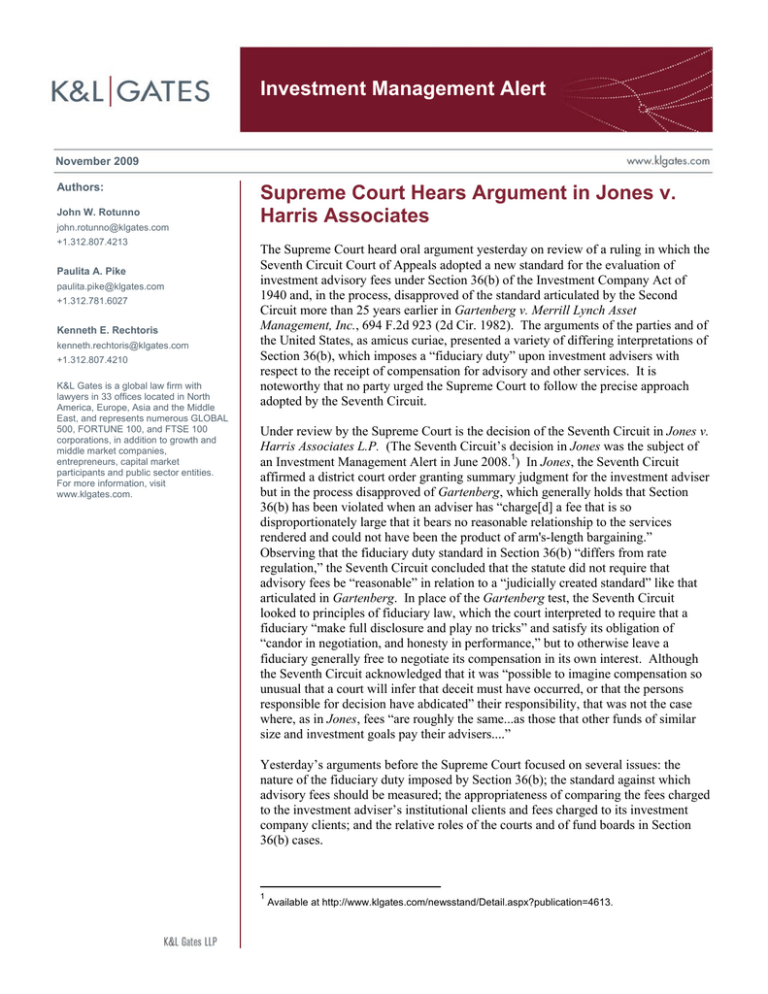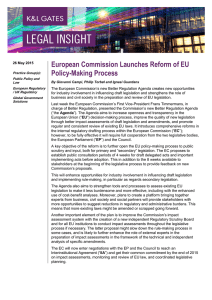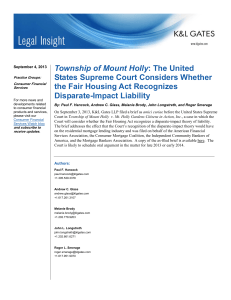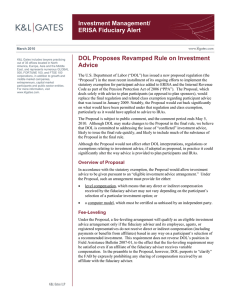
Investment Management Alert
November 2009
Authors:
John W. Rotunno
john.rotunno@klgates.com
+1.312.807.4213
Paulita A. Pike
paulita.pike@klgates.com
+1.312.781.6027
Kenneth E. Rechtoris
kenneth.rechtoris@klgates.com
+1.312.807.4210
K&L Gates is a global law firm with
lawyers in 33 offices located in North
America, Europe, Asia and the Middle
East, and represents numerous GLOBAL
500, FORTUNE 100, and FTSE 100
corporations, in addition to growth and
middle market companies,
entrepreneurs, capital market
participants and public sector entities.
For more information, visit
www.klgates.com.
Supreme Court Hears Argument in Jones v.
Harris Associates
The Supreme Court heard oral argument yesterday on review of a ruling in which the
Seventh Circuit Court of Appeals adopted a new standard for the evaluation of
investment advisory fees under Section 36(b) of the Investment Company Act of
1940 and, in the process, disapproved of the standard articulated by the Second
Circuit more than 25 years earlier in Gartenberg v. Merrill Lynch Asset
Management, Inc., 694 F.2d 923 (2d Cir. 1982). The arguments of the parties and of
the United States, as amicus curiae, presented a variety of differing interpretations of
Section 36(b), which imposes a “fiduciary duty” upon investment advisers with
respect to the receipt of compensation for advisory and other services. It is
noteworthy that no party urged the Supreme Court to follow the precise approach
adopted by the Seventh Circuit.
Under review by the Supreme Court is the decision of the Seventh Circuit in Jones v.
Harris Associates L.P. (The Seventh Circuit’s decision in Jones was the subject of
an Investment Management Alert in June 2008.1) In Jones, the Seventh Circuit
affirmed a district court order granting summary judgment for the investment adviser
but in the process disapproved of Gartenberg, which generally holds that Section
36(b) has been violated when an adviser has “charge[d] a fee that is so
disproportionately large that it bears no reasonable relationship to the services
rendered and could not have been the product of arm's-length bargaining.”
Observing that the fiduciary duty standard in Section 36(b) “differs from rate
regulation,” the Seventh Circuit concluded that the statute did not require that
advisory fees be “reasonable” in relation to a “judicially created standard” like that
articulated in Gartenberg. In place of the Gartenberg test, the Seventh Circuit
looked to principles of fiduciary law, which the court interpreted to require that a
fiduciary “make full disclosure and play no tricks” and satisfy its obligation of
“candor in negotiation, and honesty in performance,” but to otherwise leave a
fiduciary generally free to negotiate its compensation in its own interest. Although
the Seventh Circuit acknowledged that it was “possible to imagine compensation so
unusual that a court will infer that deceit must have occurred, or that the persons
responsible for decision have abdicated” their responsibility, that was not the case
where, as in Jones, fees “are roughly the same...as those that other funds of similar
size and investment goals pay their advisers....”
Yesterday’s arguments before the Supreme Court focused on several issues: the
nature of the fiduciary duty imposed by Section 36(b); the standard against which
advisory fees should be measured; the appropriateness of comparing the fees charged
to the investment adviser’s institutional clients and fees charged to its investment
company clients; and the relative roles of the courts and of fund boards in Section
36(b) cases.
1
Available at http://www.klgates.com/newsstand/Detail.aspx?publication=4613.
Investment Management Alert
Petitioners argued to the Court that the fiduciary
duty imposed upon investment advisers by Section
36(b) is equivalent to other fiduciary duties
recognized in the law, such as the duties of corporate
directors, guardians or trustees, and requires that an
adviser’s fee be both “fair” and negotiated after full
disclosure by the adviser. Several questions posed
by the Court suggested skepticism with the
proposition that the test for compensation of
investment advisers is equivalent to that of other
fiduciaries. In this regard, Justice Scalia noted that
Section 36(b) imposes upon the plaintiff the burden
of proving a breach of fiduciary duty, a reversal of
the common law rule in trust cases, and Justice
Sotomayor observed that Congress, in imposing the
statutory fiduciary duty, did not require that advisory
fees be reasonable. Counsel for the United States, as
amicus curiae, took a view different from that of the
Petitioners, observing that the term “fiduciary” can
mean different things in different circumstances, and
arguing that the Congressional purpose in employing
the term “fiduciary” was to shift the focus of the fee
inquiry from a fund’s board to the investment
adviser.
Each of the parties, as well as the United States,
agreed generally with the Gartenberg-like
proposition that Section 36(b) requires that an
investment advisory fee be within a range of fees
that would be produced by arm’s-length
negotiations. The critical point on which the parties
differed was the criteria under which this standard
should be applied.
Counsel for the Petitioners argued that the best
gauge of whether an advisory fee might have been
negotiated at arm’s-length is a comparison with the
fee charged by an adviser to institutional clients for
similar advisory services. Counsel for the United
States agreed that evidence of the fee charged to
institutional clients for comparable services is a
circumstance which may be considered by a court
under Section 36(b), and suggested that an advisory
fee double the amount paid by institutional clients
might demonstrate an “unfair bargain.” The Justices
questioned both counsel for Petitioner and counsel
for Respondent about the differences between
institutional advisory services and mutual fund
advisory services. The Respondent argued that the
more relevant consideration in assessing whether an
advisory fee is within a range that might have been
negotiated at arm’s-length is the advisory fee paid
by other, similar mutual funds, and that a fund
board is not required, by SEC rules or otherwise, to
consider the fees charged to institutional clients. At
the same time, Respondent argued that the board of
trustees in the Jones case had access to information
regarding the fees charged to institutional clients, as
well as information regarding differences in the
services performed which justified the higher fees
paid by the adviser’s mutual fund clients. Counsel
for Respondent further argued that in granting
summary judgment for the investment adviser, the
district court in Jones had considered evidence
comparing the fees charged to, and the services
performed on behalf of, institutional and mutual
fund clients, warranting affirmance of the district
court judgment without the necessity of remand to
that court for further proceedings.
The parties also differed on the question of the role
of the courts in Section 36(b) cases and the
deference that courts should afford the judgments of
fund boards. Respondent and the United States
were generally in accord that the statute does not
authorize the courts to decide what a fair and
reasonable advisory fee would be, noting that
Section 36(b) requires a court to determine the
weight to be accorded to a board’s fee
determination. In this regard, a question posed by
Chief Justice Roberts made the point that the
provision in Section 36(b) permitting courts to
consider “all the circumstances” applies to the
determination of the appropriate weight to be given
to board approval of an investment advisory fee,
rather than to the appropriateness of a fee itself.
The United States, however, emphasized the role of
the courts as a check on adviser compensation
independent of board approval. In contrast to the
Respondent and the United States, Petitioners
appeared to suggest that board approval should
receive little, if any, deference because the boards of
investment companies ostensibly are unable to
“fire” their advisers, and thus lack leverage in fee
negotiations -- a premise challenged in a question
posed by Justice Scalia.
A decision in the Jones case is expected by early
2010.
November 2009
2
Investment Management Alert
For further information on the Jones case or other
investment company litigation matters, please
contact:
Paulita Pike, John W. Rotunno or Todd E. Pentecost
in our Chicago office and Jeffrey B. Maletta or
Nicholas G. Terris in our Washington, D.C. office.
Contacts:
Paulita Pike, +1.312.781.6027,
paulita.pike@klgates.com
John W. Rotunno, +1.312.807.4213,
john.rotunno@klgates.com
Todd E. Pentecost, +1.312.807.4275,
todd.pentecost@klgates.com
Jeffrey B. Maletta, +1.202.778.9062,
jeffrey.maletta@klgates.com
Nicholas G. Terris, +1.202.778.9408,
nicholas.terris@klgates.com
Anchorage Austin Beijing Berlin Boston Charlotte Chicago Dallas Dubai Fort Worth Frankfurt Harrisburg Hong Kong London
Los Angeles Miami Newark New York Orange County Palo Alto Paris Pittsburgh Portland Raleigh Research Triangle Park
San Diego San Francisco Seattle Shanghai Singapore Spokane/Coeur d’Alene Taipei Washington, D.C.
K&L Gates is a global law firm with lawyers in 33 offices located in North America, Europe, Asia and the Middle East, and represents numerous
GLOBAL 500, FORTUNE 100, and FTSE 100 corporations, in addition to growth and middle market companies, entrepreneurs, capital market
participants and public sector entities. For more information, visit www.klgates.com.
K&L Gates comprises multiple affiliated partnerships: a limited liability partnership with the full name K&L Gates LLP qualified in Delaware and
maintaining offices throughout the United States, in Berlin and Frankfurt, Germany, in Beijing (K&L Gates LLP Beijing Representative Office), in
Dubai, U.A.E., in Shanghai (K&L Gates LLP Shanghai Representative Office), and in Singapore; a limited liability partnership (also named K&L
Gates LLP) incorporated in England and maintaining offices in London and Paris; a Taiwan general partnership (K&L Gates) maintaining an office in
Taipei; and a Hong Kong general partnership (K&L Gates, Solicitors) maintaining an office in Hong Kong. K&L Gates maintains appropriate
registrations in the jurisdictions in which its offices are located. A list of the partners in each entity is available for inspection at any K&L Gates office.
This publication is for informational purposes and does not contain or convey legal advice. The information herein should not be used or relied upon
in regard to any particular facts or circumstances without first consulting a lawyer.
©2009 K&L Gates LLP. All Rights Reserved.
November 2009
3






